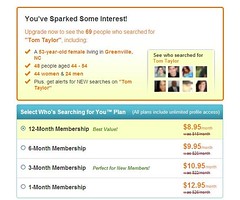I’m sure you’ve seen the commercials. A very attractive woman wants to know who might be searching for her online. She logs onto MyLife.com and seems delighted to find that lots of people have been searching for her – old high school chums, past loves, etc., etc. She naively reacts as if this is a GOOD thing. Of course, my first thought is – STALKERS! Perhaps the image below is more realistic:
Both online and in the television ads, the people portrayed are invariably young and beautiful, and more often than not are female. It’s clear who their target demographic might be. The implication is that someone like this might be searching for you…
It’s almost as if they are trying to get desperate males to log on in the hope that someone beautiful might be searching for them. Since these services also provide search capabilities, they are enabling even more stalkers. Just what we need.
Since I’m neither desperate nor naive, I thought I could safely search for my name without getting sucked into some subscription service, or giving away too much private information. I also enjoy the anonymity of a very common name, so it would be interesting to see who they said might be searching for me.
When I entered my name and zip code, this is what came up…
Hmm, 60 people are looking for me – 40 females and 20 males. Yeah, right. Again, is this real, or is the number for the opposite sex skewed to entice me in further?
I clicked to continue further into the trap, and only got to one more screen before they started asking me for money. Once again, the thumbnail shots show attractive people, this time women and men, most likely none of whom know me from Adam.
Not surprisingly, a number of complaints have been registered against the site (also here.) Most of these are about the inability to cancel a membership once it’s started. Some are complaints about them having and giving away personal data. Here’s another complaint about the website, posted on someone’s blog, which describes one of the processes MyLife uses to capture e-mail addresses from your contacts. Finally, from the Social Meteor website comes this comment:
What do you get when you combine leading people search technology and the personal data of 50 million+ users? A REALLY, REALLY, BAD idea called mylife.com €” a rebranded version of reunion.com profiles linked to personal data from wink.com.
So, what it boils down to is this – stay away from MyLife.com (Notice that I’ve not directly linked to that site in any of these comments.)
However, MyLife isn’t alone. I was on the committee for our 30th high school reunion, and signed up for Classmates.com as a possible way of organizing our reunion. Big mistake. They went from having free accounts to having all paid services. I kept getting e-mails saying that X number of people had been looking for me. When I tried to log on to see who this might be, I would have had to sign up for a subscription to view the names. Trying to unsubscribe and remove my name from their list was useless – I still got the e-mails. Now they just automatically get sent to my spam/trash folder.
Despite the anonymity of my common name, I have a HUGE online footprint, what with this blog, my Flickr account, all my social media, and all of the web projects with which I’m involved. Someone who really knows me or something about me is going to be able to find a way to get in touch with me. However, I’m careful about what information I make available online, even on sites such as Facebook. Even so, I suffer no illusions that my personal information isn’t out there somewhere (for the right fee.) I just do what I can to minimize that impact.
That’s all anyone really can do, apart from staying offline altogether. Use some common sense and don’t give out personal information. And if an ad makes you think that an amazing number of of beautiful people are looking for you, beware.




